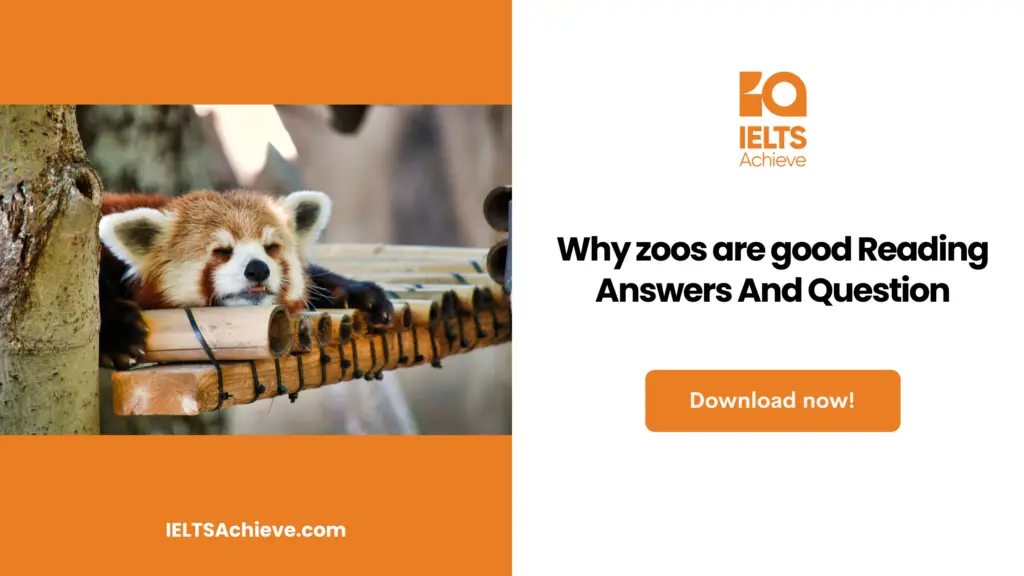The Blog post contains the following IELTS Reading Questions:
- IELTS Reading Locating Information
- IELTS Reading True False Not given
- IELTS Reading Multiple Choice Questions
Stay informed and prepared for success – Explore our comprehensive Reading Test Info page to get valuable insights, exam format details, and expert tips for mastering the IELTS Reading section.
IELTS Reading Passage – Why zoos are good

Why zoos are good
From my perspective, many types of animals residing in zoos or wildlife reserves can have a level of well-being that is equal to or better than that found in the jungle. Animals in reputable zoos are fed a diversified, high-quality diet that includes all of the necessary nutrients, and any ailments they may have are treated. Their freedom of mobility may be limited, but they reside in a safe facility free of violence and social exclusion from others of their species. They are not threatened or stressed by predators, nor are they bothered by infections or wounds. About its wild equivalent, the typical trapped animal will also have a longer life expectancy and will not perish from dehydration, famine, or being caught in a predator’s jaws. Compared to its wild equivalent, the typical caged animal will live longer and won’t perish from malnutrition, drought, or a predator’s teeth. I believe it is incorrect to assume that a life that is “free” is necessarily “good” because a lot of extremely bad things occur to genuinely “wild” animals that just don’t happen in decent zoos.
For starters, zoos help with conservation. Countless species are going extinct around the planet, and several are becoming increasingly vulnerable, putting them at risk of extinction. Furthermore, several of these accidents were unanticipated, spectacular, and sudden, or were discovered later. A species that has been produced in confinement can be used as a reserved breed in the event of a population decline or extermination in the wilderness. Many species can only be found in cages, with several of them living in zoos. They are only found in forests as they were returned from zoos but also because their wild numbers have been bolstered by captive-bred animals. There would be fewer animals alive now if these efforts had not been made. Even though rehabilitation achievements are few and far between, the figure grew, and the fact that animals have been preserved or re-established as a result of breeding programs underlines the significance of such efforts.
In addition to this, there is also the education that can take place in zoos through signs, talks, and presentations that directly communicate information to visitors about the animals they are seeing and their place in the world. Zoos might have been poor in this area, but they are currently becoming more advanced in marketing and grassroots efforts. Many people will gain a better grasp of things and a different point of view as a result, and they will hopefully have a better appreciation for nature, conservation efforts, and how they may help.
Zoos also play an important part in scientific study. We ought to understand how vital species live, act, and react if we are to rescue wildlife and recover and rebuild habitats. Radical progress in wild species can be achieved by conducting studies on mammals and birds because there is less danger and fewer uncertainties. For instance, knowing about an animal’s oestrus cycle or breeding rate can assist us in regulating wildlife. Research findings in zoos regarding anesthetic doses, as well as expertise in managing and transferring animals, help with procedures like collecting and relocating at-risk or violent creatures. This could aid in the conservation and the decrease of human-animal conflicts, as well as provide a skill set for addressing the growing concerns of loss of habitat and other issues.
In conclusion, given the various ongoing worldwide environmental risks, I find it difficult to regard zoos as anything but critical to the ability of thousands of species to survive. Zoos used to be poor in this area, but they are currently becoming more advanced in their marketing and outreach efforts. They are essential for more than just animal protection; they are also essential to learning about animals to help those that are still in the jungle, as well as for educating and notifying the wider populace about these living creatures and their globe so how they can support or at least acknowledge being more eco friendly. A species that has been produced in confinement can be used as a reserve species in the event of a population collapse or extermination in nature. Many species can only be found in confinement, with several of them.
Unlock your full potential in the IELTS Reading section – Visit our IELTS Reading Practice Question Answer page now!
Recommended Questions:
Renewable Energy IELTS Reading Question with Answer
Why zoos are good IELTS Reading questions
Questions 1-4:
The reading passage has six paragraphs, A-F. Which paragraph contains the following information? Write the correct letter, A-F, in boxes 1-4 on your answer sheet
- a reference to how quickly animal species can die out
- reasons why it is preferable to study animals in captivity rather than in the wild
- mention of two ways of learning about animals other than visiting them in zoos
- reasons why animals in zoos may be healthier than those in the wild
Questions 5-9 :
Do the following statements agree with the information given in the reading passage? In boxes 5-10 on your answer sheet, write
TRUE: if the statement agrees with the information
FALSE: if the statement contradicts the information
NOT GIVEN: if there is no information on this
5. An animal is likely to live longer in a zoo than in the wild
6. There are some species in zoos that can no longer be found in the wild.
7. Improvements in the quality of TV wildlife documentaries have resulted in increased numbers of zoo visitors.
8. Zoos have always excelled at transmitting information about animals to the public.
9. Studying animals in zoos is less stressful for the animals than studying them in the wild.
Enhance your skills in identifying information as True, False, or Not Given. Click here to discover expert strategies and techniques for mastering this question type in the IELTS Reading section.
Questions 10 and 11
Choose TWO letters, A-E. Write the correct letters in boxes 23 and 24 on your answer sheet.
Which TWO of the following are stated about zoo staff in the text?
- Some take part in television documentaries about animals
- Some travel to overseas locations to join teams in zoos.
- Some get experience with species in the wild before taking up zoo jobs.
- Some teach people who are involved with conservation projects.
- Some specialize in caring for species that are under threat.
Ready to improve your performance in Multiple Choice Questions (MCQs)? Click here to access our comprehensive guide on how to tackle MCQs effectively in the IELTS Reading section.
Questions 12 and 13:
Choose TWO letters, A-E. Write the correct letters in boxes 25 and 26 on your answer sheet.
Which TWO of these beliefs about zoos does the writer mention in the text?
- They can help children overcome their fears of wild animals.
- They can increase public awareness of environmental issues.
- They can employ a range of professional people.
- They can generate income to support wildlife conservation projects.
- They can raise animals that can later be released into the wild.
Ready to improve your performance in Multiple Choice Questions (MCQs)? Click here to access our comprehensive guide on how to tackle MCQs effectively in the IELTS Reading section.
Unlock your full potential in the IELTS Reading section – Visit our IELTS Reading Practice Question Answer page now!
Recommended Questions:
Renewable Energy IELTS Reading Question with Answer
Why Zoos Are Good IELTS Reading Answers
Answer: B
Answer: E
Answer: C
Answer: A
Answer: TRUE
Answer: TRUE
Answer: NOT GIVEN
Answer: FALSE
Answer: NOT GIVEN
Answer: B
Answer: D
Answer: B
Answer: E

We hope you found this post useful in helping you to study for the IELTS Test. If you have any questions please let us know in the comments below or on the Facebook page.
The best way to keep up to date with posts like this is to like us on Facebook, then follow us on Instagram and Pinterest. If you need help preparing for the IELTS Test, join the IELTS Achieve Academy and see how we can assist you to achieve your desired band score. We offer an essay correction service, mock exams and online courses.


